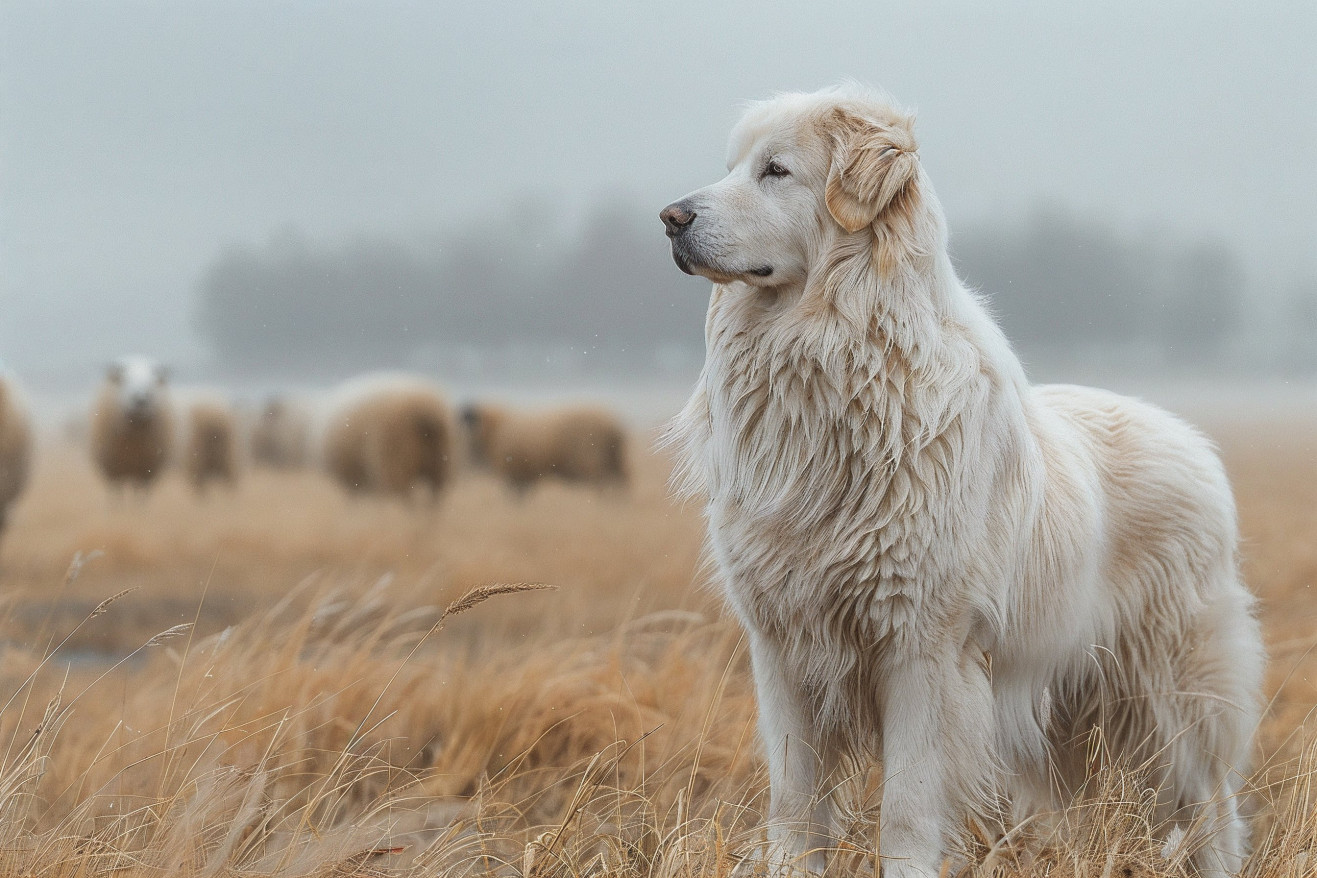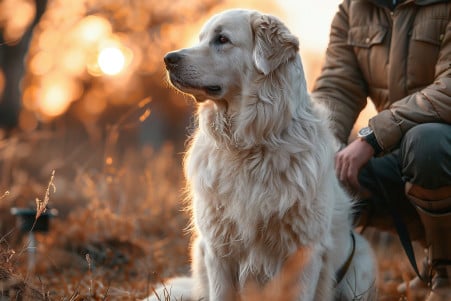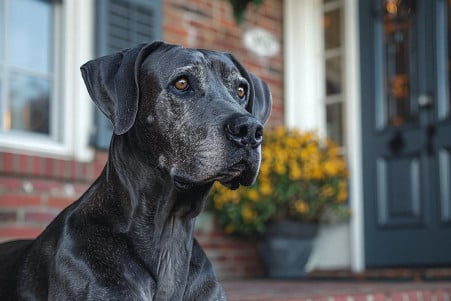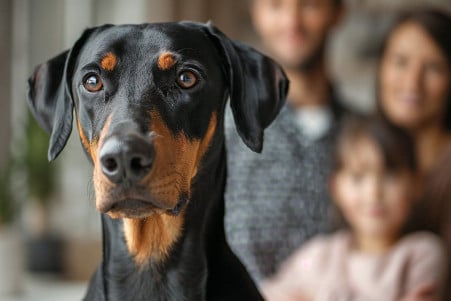Do Great Pyrenees Have Aggression? What You Need to Know About This Gentle Giant
21 April 2024 • Updated 21 April 2024

Great Pyrenees dogs are often described as gentle giants, but despite their size, do they ever show aggression? Since Great Pyrenees were originally bred to be livestock guardian dogs, they can be territorial and protective of their families - but aggression towards their owners is very rare when properly trained and socialized from a young age.
Although Great Pyrenees do have some natural protective instincts, we'll discuss studies from dog behaviorists and historians that explain the genetic and environmental factors that can lead to aggression in this ancient breed. Through an analysis of empirical evidence and breed characteristics, you'll learn how to tell the difference between aggressive behavior and the Pyr's natural guarding instincts, and how to address any unwanted behaviors with positive reinforcement training. By learning more about the breed's temperament, you can decide if a Great Pyrenees is the best choice for your loving family pet.
Are Great Pyrenees aggressive?
Bred for Protection: Why the Great Pyrenees Is So Protective
The Great Pyrenees was originally bred as a flock guardian in the Pyrenees mountains that separate France and Spain, according to the American Kennel Club’s breed history. Therefore, the breed’s protective instincts and territorial tendencies are a direct result of their history as a guardian of sheep. As a result, the Great Pyrenees is predisposed to protect their companions and be territorial over what they perceive as their property.
Despite their size, the Great Pyrenees’ protective nature is not aggressive. They are loyal to their family and will warn or even protect them if they feel they are in danger. However, training and socialization are important to ensure that their guarding instincts are controlled. Territorial or protective behaviors like barking, growling, or standing between their family and a perceived threat can be managed with positive reinforcement.
For instance, The Spruce Pets explains that the breed “can be very calm, loyal, and loving companions” if their protective instincts are channeled properly. With the right training, this ancient flock guardian can be a kind and loving family guardian. Their protective behaviors are a result of their breeding rather than a sign of aggression.
Socialization: The Secret to a Well-Behaved Great Pyrenees
Proper socialization is key for Great Pyrenees puppies to grow into well-behaved adult dogs, says iHeartDogs. The best time for socialization is between 7-16 weeks of age, when puppies are most open to new experiences and learning. This is the time to introduce the puppy to a variety of people, animals, and situations in a positive way to avoid fear, aggression, and other problems in the future.
As DB Farms explains, socialization is an ongoing process that should continue past the critical puppy stage. Puppy classes, controlled interactions, and positive reinforcement training are all helpful tools for socializing a Great Pyrenees. Because this breed can be standoffish with strangers due to their protective nature, Wag! notes that it's important to work on socializing them with other dogs and people in a patient and consistent manner.
Exercise and Activity Levels of the Great Pyrenees
The Great Pyrenees is a large dog that needs a moderate amount of exercise. They are not as high-energy as some other working breeds, but they still require regular physical activity.
According to the National Great Pyrenees Rescue, they are not particularly playful dogs, but they do need to be taken on a daily walk. In addition to walks, they will enjoy romping in a securely fenced yard.
In addition to physical exercise, the Great Pyrenees also needs mental stimulation. They are intelligent dogs that are eager to please, so they tend to respond well to training. However, they can be independent, so they may not always be obedient.
The Great Pyrenees is also a natural guardian, so they may be suspicious of strangers and protective of their family and territory. This can lead to barking and other behaviors that may be problematic if not properly managed.
To ensure that the Great Pyrenees is well-behaved, it is important to start training and socialization early and to continue it throughout the dog's life. This will help them learn to be well-mannered and will help them get along with other people and animals.
Physical and Mental Exercise for the Great Pyrenees
Great Pyrenees need a moderate amount of exercise each day, with most dogs needing between 30-60 minutes of exercise, says BorrowMyDoggy. This can include walks, hikes, and playtime in a fenced-in yard. Brown Veterinary Hospital suggests that adult Pyrs need 30-40 minutes of exercise per day.
Mental stimulation is also important and can be achieved through training, puzzle toys, and exposure to new people, places, and things. iHeartDogs explains that mental enrichment is just as important as physical exercise and can help keep the Great Pyrenees mentally stimulated and healthy.
Exercise requirements change as dogs age, and puppies will need more frequent but shorter exercise sessions until they are fully grown, which can take 18-24 months according to BorrowMyDoggy. Making sure to exercise and mentally challenge the Great Pyrenees is important to prevent boredom and behavioral problems in this large breed.
Great Pyrenees: Common Health Issues
Great Pyrenees are generally healthy dogs, but there are a few health issues that they are more prone to. These include:
- Hip Dysplasia: This is a common issue for many large dog breeds. It occurs when the thighbone doesn't fit properly into the hip joint, which can cause lameness and arthritis.
- Elbow Dysplasia: This is another common issue for large dogs. It occurs when the three bones that make up the elbow joint don't fit together properly.
- Patellar Luxation: This is a condition in which the kneecap dislocates or moves out of its normal location.
- Osteosarcoma: This is a type of bone cancer that is most commonly found in large and giant dog breeds.
- Bloat: This is a life-threatening condition that occurs when a dog's stomach fills with gas, food, or fluid. It can cause the stomach to twist, which can be fatal if it's not treated immediately.
If you're considering adopting a Great Pyrenees, it's important to work with a reputable breeder who can provide you with health clearances for both of your puppy's parents. This can help ensure that your puppy is less likely to develop any of these health issues.
Conclusion: Is the Great Pyrenees the Right Breed for You?
The Great Pyrenees is a beautiful and loving dog, with a strong sense of loyalty and protectiveness. While they are large, they are not typically aggressive. In fact, according to Dogtime, they are "gentle, calm, and loyal dogs" that are great for families and can also be used as guard dogs.
That said, their independence and strong guarding instincts mean they need to be socialized and trained from an early age to ensure they grow up to be well-behaved. As the American Kennel Club explains, if they are properly socialized and trained, Great Pyrenees will be protective but not aggressive, and they will be loving and gentle with their families.
Their loving nature and patience with children mean they can be a good fit for many families. However, according to The Spruce Pets, they need to be around their families a lot to prevent them from becoming bored and engaging in destructive behavior. As a result, people considering adopting a Great Pyrenees should make sure they can meet their exercise, training, and socialization needs before bringing one home.


